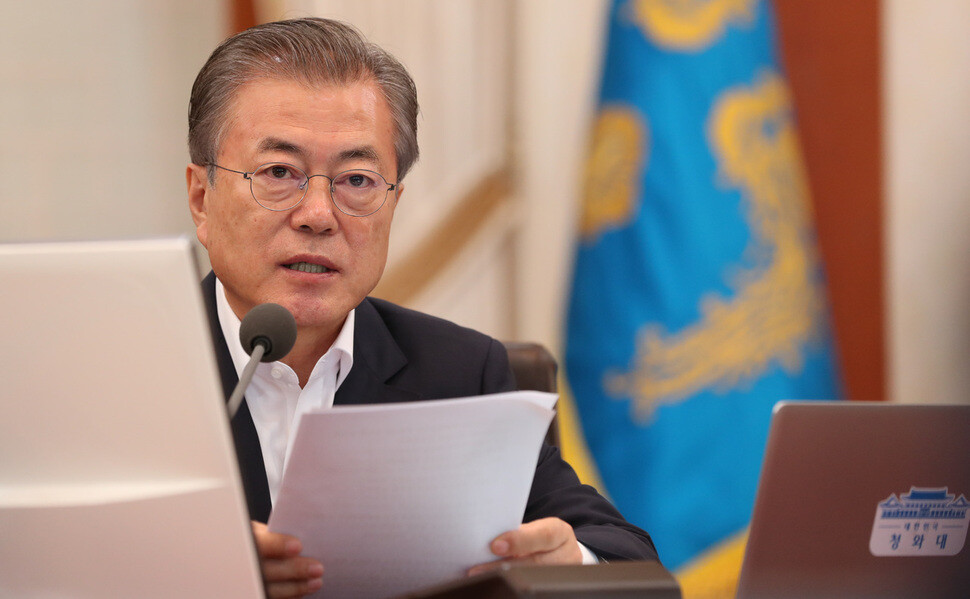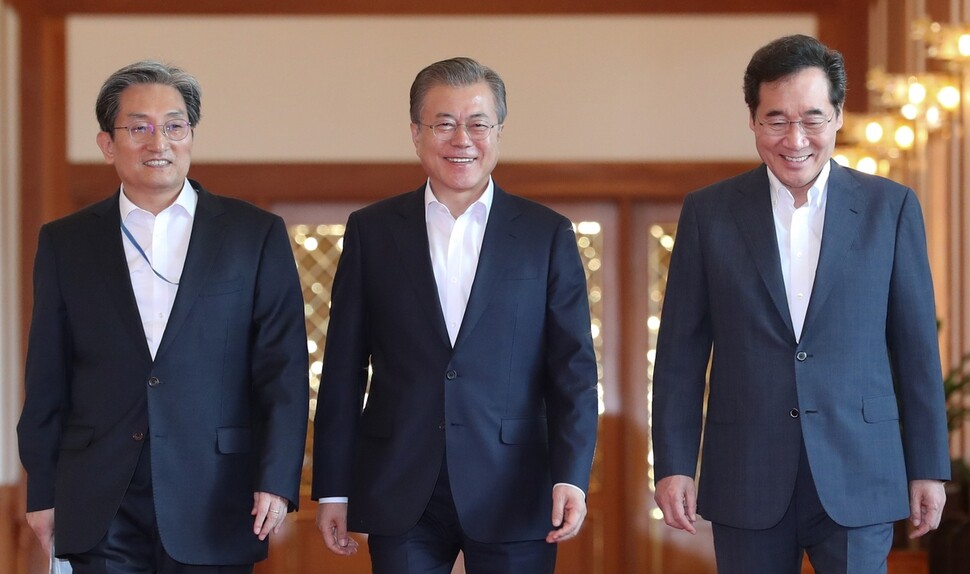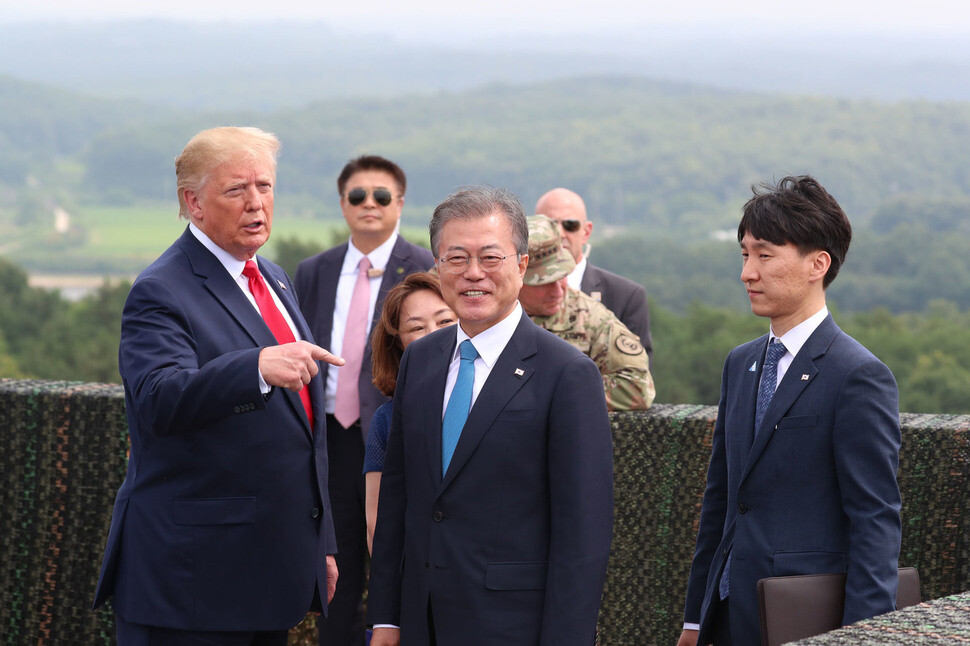hankyoreh
Links to other country sites 다른 나라 사이트 링크
Moon says N. Korea-US have declared the end of their “hostile relationship”

“Now it can be said that not only South and North Korea but also North Korea and the US have declared the end of their hostile relationship and the true beginning of a new era of peace, not through signatures on a document but through action,” South Korean President Moon Jae-in said on July 2, emphasizing the significance of the summit held by the leaders of North Korea and the US at Panmunjom two days earlier. The first meeting between the leaders of these three countries at Panmunjom, Moon asserted, meant that the Korean Peninsula could never return to the hostility of past wars. Given the extreme importance of the upcoming working-level talks between North Korea and the US, Moon appears to have slowed down efforts to improve inter-Korean relations, including a reciprocal visit to Seoul by Kim Jong-un.
Moon made these comments during his opening remarks to a cabinet meeting that was held at the Blue House. “If we always bring up that fact and underline its significance during the upcoming North Korea-US dialogue and use it as the foundation for dialogue, I believe that our dialogue will bear great fruit,” Moon said, hinting at his considerable expectations.

The South Korean president furthermore underlined ways in which the bilateral and trilateral meetings at Panmunjom were distinctly different from past meetings. “For the first time in the 66 years since the Korean Armistice Agreement was signed, the leaders of North Korea and the US shook hands at the Military Demarcations Line, and the North Korean leader led the American leader over that line and onto North Korean soil without any special security measures. This was also the first time ever that the leaders of both countries visited a guard post on the front lines in a suit and tie, rather than in military fatigues and body armor,” Moon said.
“President Trump joined me to view effects that have been excavated as part of the ongoing efforts to recover the remains of soldiers at Arrowhead Hill, and he indicated that he understands how urgent security and peace are in the Republic of Korea.”
Kim Yong-hyun, a professor at Dongguk University, said that the three leaders’ meeting at Panmunjom “can be regarded as effectively being a declaration of the end of the war by South Korea, North Korea, and the US. Though it wasn’t formal or official, this basically spells the end of the armistice system that has been in place for 66 years, and it’s in that sense that President Moon personally described this as a historic day on the path toward a peace regime,” Kim said.
“Whereas the concept of peace has hitherto been abstract, things are different now since we’ve seen and heard for ourselves that the door lies open to a peace regime,” the professor added.
Putting inter-Korean relations on hold to progress N. Korea-US relations
While this historic event helped North Korea and the US to break through their protracted deadlock, that’s not expected to lead immediately to rapid progress in inter-Korean relations. “As I’ve often done before, I’d like to emphasize once again that improving inter-Korean relations and reaching progress in North Korea-US dialogue constitute a virtuous cycle,” Moon said during the cabinet meeting, without making any mention of an inter-Korean summit.
“Under these circumstances, it’s more important to hold [another] North Korea-US summit [than an inter-Korean summit]. Though Chairman Kim has agreed to make a reciprocal visit [to Seoul], the priority is on North Korea-US talks,” said a high-ranking official at the Blue House. According to this official, decisions about holding a fourth inter-Korean summit or arranging Kim’s visit to Seoul will be made after tracking developments in North Korea-US dialogue.
“[The government] appears to be saying that it won’t unnecessarily provoke North Korea in order to support North Korea-US relations and bolster cooperation with the US after openly offering a mediation plan in North Korea-US negotiations,” said Hong Min, director of the North Korea research office at the Korea Institute for National Unification.
“Even if the South Korean government is maintaining a low profile in its mediation between the two sides, that doesn’t mean it will give up efforts to implement inter-Korean agreements. Once it gets a green light from North Korea, the South needs to proactively revitalize relations,” Hong advised.
“If North Korea-US relations improve and sanctions are eased or lifted altogether, South Korea will have more options. Exemptions from sanctions, for example, could make it easier to move ahead on inter-Korean economic cooperation projects. In that sense, the current government’s decision not to rush into promoting inter-Korean relations is a decent one,” said Koo Kab-woo, a professor at the University of North Korean Studies.

Panmunjom meeting may have opened up more room for inter-Korean dialogue
Some analysts think that the Panmunjom meeting has also given North Korea leeway to engage in dialogue with the South. “Inter-Korean relations had been brought to a standstill by North Korea’s organizational reshuffling and Kim’s frustration with South Korea following the Hanoi summit, but the North has probably realized that Moon played a major role in arranging Kim and Trump’s meeting at Panmunjom. That will likely lead to high-level inter-Korean talks or working-level talks aimed at bringing that about,” said Yang Moo-jin, a professor at the University of North Korean Studies.
The first meeting between the leaders of South Korea, North Korea, and the US was also significant in that it demonstrated the possibility of exercising completely unexpected “diplomatic creativity” moving forward. “We need to constantly exercise creativity in order to achieve the truly challenging historical task of achieving the complete denuclearization of the Korean Peninsula and building a lasting peace regime,” Moon said during his cabinet meeting on Tuesday.
By Lee Wan and Noh Ji-won, staff reporters
Please direct comments or questions to [english@hani.co.kr]

Editorial・opinion
![[Column] Has Korea, too, crossed the Rubicon on China? [Column] Has Korea, too, crossed the Rubicon on China?](https://flexible.img.hani.co.kr/flexible/normal/500/300/imgdb/original/2024/0419/9317135153409185.jpg) [Column] Has Korea, too, crossed the Rubicon on China?
[Column] Has Korea, too, crossed the Rubicon on China?![[Correspondent’s column] In Japan’s alliance with US, echoes of its past alliances with UK [Correspondent’s column] In Japan’s alliance with US, echoes of its past alliances with UK](https://flexible.img.hani.co.kr/flexible/normal/500/300/imgdb/original/2024/0419/2317135166563519.jpg) [Correspondent’s column] In Japan’s alliance with US, echoes of its past alliances with UK
[Correspondent’s column] In Japan’s alliance with US, echoes of its past alliances with UK- [Editorial] Does Yoon think the Korean public is wrong?
- [Editorial] As it bolsters its alliance with US, Japan must be accountable for past
- [Guest essay] Amending the Constitution is Yoon’s key to leaving office in public’s good graces
- [Editorial] 10 years on, lessons of Sewol tragedy must never be forgotten
- [Column] A death blow to Korea’s prosecutor politics
- [Correspondent’s column] The US and the end of Japanese pacifism
- [Guest essay] How Korea turned its trainee doctors into monsters
- [Guest essay] As someone who helped forge Seoul-Moscow ties, their status today troubles me
Most viewed articles
- 1[Column] The clock is ticking for Korea’s first lady
- 2After 2 months of delayed, denied medical care, Koreans worry worst may be yet to come
- 3Samsung barricades office as unionized workers strike for better conditions
- 4[Column] Has Korea, too, crossed the Rubicon on China?
- 5[Correspondent’s column] In Japan’s alliance with US, echoes of its past alliances with UK
- 6Hong Se-hwa, voice for tolerance whose memoir of exile touched a chord, dies at 76
- 7All eyes on Xiaomi after it pulls off EV that Apple couldn’t
- 8US overtakes China as Korea’s top export market, prompting trade sanction jitters
- 9[Editorial] When the choice is kids or career, Korea will never overcome birth rate woes
- 10[Photo] Smile ambassador, you’re on camera